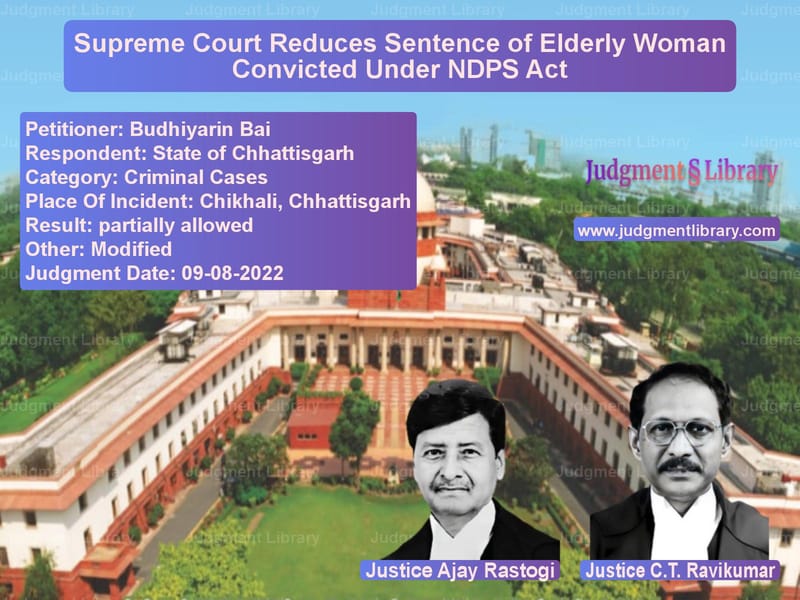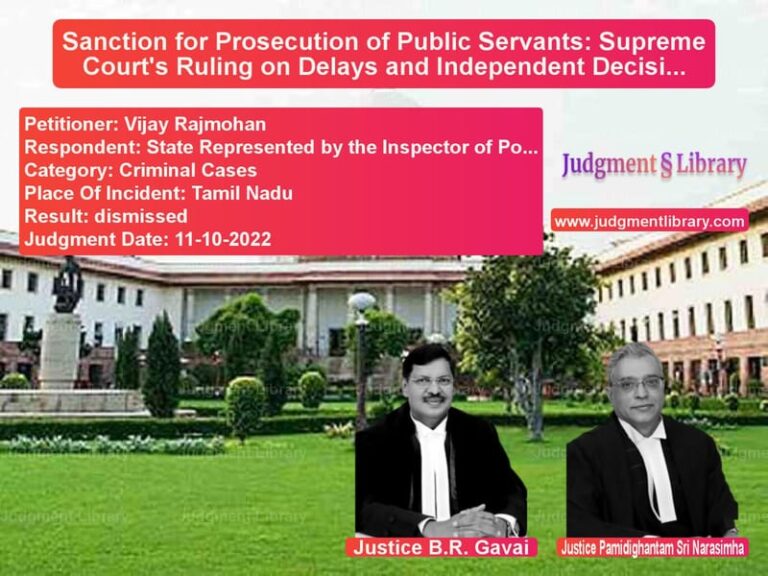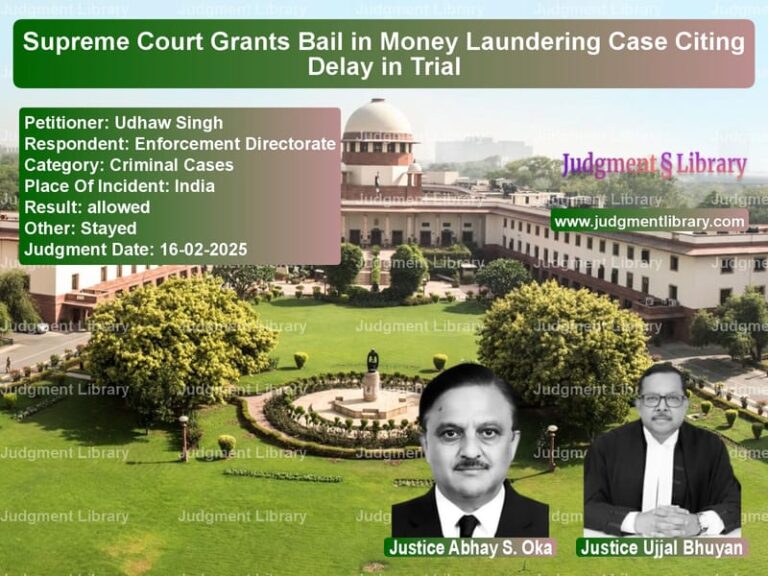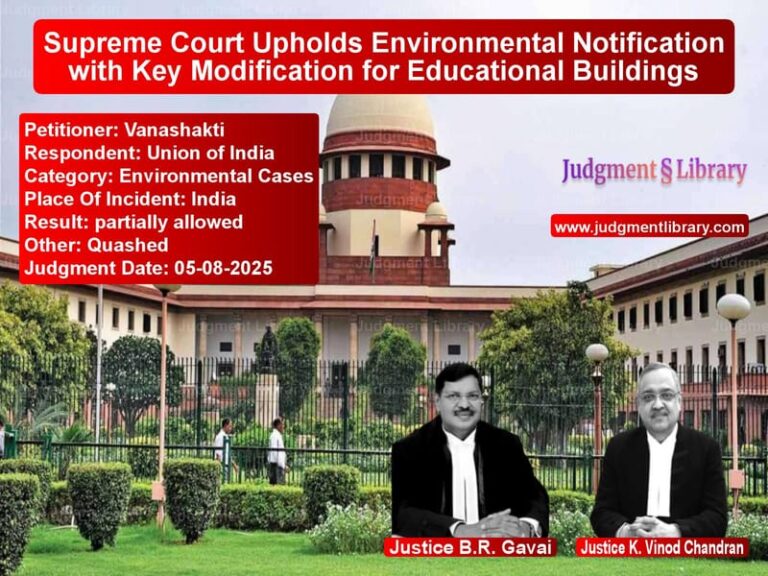Supreme Court Reduces Sentence of Elderly Woman Convicted Under NDPS Act
The Supreme Court of India, on August 10, 2022, delivered an important judgment in the case of Budhiyarin Bai vs. State of Chhattisgarh. The case involved the conviction of an elderly, illiterate woman under Section 20(b)(ii)(C) of the Narcotic Drugs and Psychotropic Substances (NDPS) Act, 1985. The appellant had been sentenced to 15 years’ rigorous imprisonment along with a fine of Rs.1 lakh by the Trial Court, which was later upheld by the High Court. The Supreme Court, while maintaining the conviction, reduced the sentence to 12 years of rigorous imprisonment, considering the appellant’s age and circumstances.
The judgment highlights the balance between the stringent provisions of the NDPS Act and judicial discretion in sentencing, especially in cases involving vulnerable individuals.
Background of the Case
The case dates back to January 15, 2011, when the police received information regarding illegal possession of narcotics in the house of the appellant in Village Chikhali, Chhattisgarh. The police raided the premises and found a substantial quantity of cannabis (ganja) stored in 20 sacks.
The recovered narcotics weighed 521.5 kg, which falls under the category of “commercial quantity” under the NDPS Act. The appellant, along with her two sons, Pila Ram and Rajkumar, was charged with drug trafficking. Two other co-accused, Rajendra Tiwari and Idris Khan, were charged under Section 27-A of the NDPS Act for allegedly delivering the narcotics.
Trial Court Proceedings
The prosecution relied on the testimony of nine witnesses, including the police officers who conducted the raid. The following key points were established:
- The police, led by Inspector Vinay Singh Baghel, conducted a search at the appellant’s residence.
- A total of 521.5 kg of cannabis was recovered in the presence of independent witnesses.
- The appellant failed to produce any legal documents authorizing possession of the narcotics.
- The seized contraband was sealed and sent for forensic analysis.
Based on this evidence, the Trial Court found the appellant guilty under Section 20(b)(ii)(C) of the NDPS Act and sentenced her to:
- 15 years’ rigorous imprisonment
- Rs.1 lakh fine
- In default of fine, an additional 3 years’ rigorous imprisonment
High Court Appeal
The appellant challenged her conviction before the Chhattisgarh High Court. The appeal was dismissed, and the High Court upheld the Trial Court’s findings, observing:
“The recovery of commercial quantity of cannabis from the residence of the appellant proves her involvement. The compliance of Sections 42, 50, and 55 of the NDPS Act was duly followed.”
After losing the appeal in the High Court, the appellant approached the Supreme Court.
Arguments Before the Supreme Court
Appellant’s (Budhiyarin Bai) Arguments
The defense, led by Senior Advocate Ashok Kumar Pandey, argued:
- The appellant is an illiterate, elderly woman with no prior criminal record.
- She was unaware of the narcotics trade conducted by her sons and other accused persons.
- The conviction was solely based on her presence in the house where narcotics were found.
- The stringent sentence of 15 years’ imprisonment was excessive and needed reconsideration.
Respondent’s (State of Chhattisgarh) Arguments
The prosecution, represented by Advocate General Anand Kumar, countered:
- The appellant was residing in the house and had control over the premises.
- The seizure of narcotics from her house proves her complicity.
- The offense falls under the “commercial quantity” category, requiring strict punishment under the NDPS Act.
- The High Court had already upheld the conviction based on valid evidence.
Supreme Court’s Observations
1. Stringency of NDPS Act
The Court reaffirmed that offenses under the NDPS Act are serious and detrimental to society:
“The offenses under the NDPS Act are very serious in nature and affect society at large. No leniency should be shown to those indulging in drug trafficking.”
2. Consideration of Mitigating Factors
However, the Court acknowledged the personal circumstances of the appellant:
“The appellant is an illiterate senior citizen from a rural background. She was residing with her two grown-up children, who may have been engaged in illegal activities. These factors were overlooked by the lower courts.”
3. Applicability of Section 32B of NDPS Act
The Court observed that while the minimum sentence under Section 20(b)(ii)(C) is 10 years, additional considerations under Section 32B should have been taken into account before imposing a higher sentence.
Read also: https://judgmentlibrary.com/supreme-court-allows-informants-plea-in-karnataka-murder-case/
4. Reduction of Sentence
Considering the appellant’s age and absence of prior criminal history, the Court modified the sentence:
- Reduced imprisonment from 15 years to 12 years
- Fine of Rs.1 lakh retained
- In default of fine, additional 6 months’ imprisonment instead of 3 years
Final Judgment
The Supreme Court ruled:
“The conviction of the appellant under Section 20(b)(ii)(C) of the NDPS Act is upheld. However, considering her old age and lack of criminal history, the sentence is reduced to 12 years of rigorous imprisonment with a fine of Rs.1 lakh.”
Impact of the Judgment
This judgment has significant implications:
- Upholds the stringency of the NDPS Act while allowing judicial discretion in sentencing.
- Recognizes mitigating factors such as age, background, and first-time offense.
- Ensures proportionality in sentencing by reducing excessive punishment.
Conclusion
The Supreme Court’s ruling in Budhiyarin Bai vs. State of Chhattisgarh strikes a balance between deterrence and proportionality in sentencing under the NDPS Act. While reaffirming the seriousness of drug offenses, the judgment acknowledges the need for individualized sentencing, particularly for vulnerable individuals. This decision sets a precedent for fair sentencing practices while maintaining the integrity of the NDPS Act.
Petitioner Name: Budhiyarin Bai.Respondent Name: State of Chhattisgarh.Judgment By: Justice Ajay Rastogi, Justice C.T. Ravikumar.Place Of Incident: Chikhali, Chhattisgarh.Judgment Date: 09-08-2022.
Don’t miss out on the full details! Download the complete judgment in PDF format below and gain valuable insights instantly!
Download Judgment: budhiyarin-bai-vs-state-of-chhattisgar-supreme-court-of-india-judgment-dated-09-08-2022.pdf
Directly Download Judgment: Directly download this Judgment
See all petitions in Drug Possession Cases
See all petitions in Bail and Anticipatory Bail
See all petitions in Judgment by Ajay Rastogi
See all petitions in Judgment by C.T. Ravikumar
See all petitions in partially allowed
See all petitions in Modified
See all petitions in supreme court of India judgments August 2022
See all petitions in 2022 judgments
See all posts in Criminal Cases Category
See all allowed petitions in Criminal Cases Category
See all Dismissed petitions in Criminal Cases Category
See all partially allowed petitions in Criminal Cases Category







